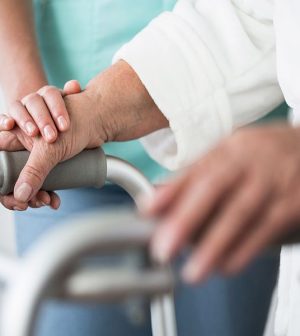- Could Your Grocery Store Meat Be Causing Recurring UTIs?
- Are You Making This Expensive Thermostat Error This Winter?
- Recognizing the Signs of Hypothyroidism
- 10 Strategies to Overcome Insomnia
- Could Artificial Sweeteners Be Aging the Brain Faster?
- Techniques for Soothing Your Nervous System
- Does the Water in Your House Smell Funny? Here’s Why
- Can a Daily Dose of Apple Cider Vinegar Actually Aid Weight Loss?
- 6 Health Beverages That Can Actually Spike Your Blood Sugar
- Treatment Options for Social Anxiety Disorder
Fracture Risk Higher for Seniors With Diabetes

Seniors with type 2 diabetes may be at increased risk for fractures. And researchers think they know why.
“Fracture in older adults with type 2 diabetes is a highly important public health problem and will only increase with the aging of the population and growing epidemic of diabetes,” said study author Dr. Elizabeth Samelson.
Samelson and her colleagues used special medical scans to assess more than 1,000 people over a three-year study period. The investigators found that older adults with type 2 diabetes had bone weakness that cannot be measured by standard bone density testing.
“Our findings identify skeletal deficits that may contribute to excess fracture risk in older adults with diabetes and may ultimately lead to new approaches to improve prevention and treatment,” said Samelson, of Hebrew SeniorLife’s Institute for Aging Research in Boston.
Fractures among seniors with osteoporosis — the age-related bone-thinning disease — are a major concern. Such fractures can lead to decreased quality of life, disability and even death, as well as significant health care costs, she said in an institute news release.
Even those with normal or higher bone density than their peers appeared to have a higher fracture risk if they had type 2 diabetes, the researchers said.
Specifically, these people had a 40 percent to 50 percent increased risk of hip fracture, the findings showed. This is considered the most serious type of osteoporosis-related fracture.
The study authors said that better understanding of the various factors that influence bone strength and fractures will aid prevention efforts.
The report was published Sept. 20 in the Journal of Bone and Mineral Research.
More information
The U.S. National Institutes of Health has more on bone health.
Source: HealthDay
Copyright © 2026 HealthDay. All rights reserved.










